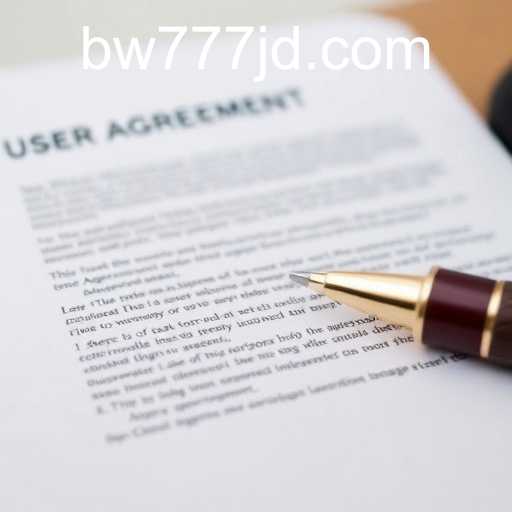User Agreement: A Comprehensive Exploration
User agreements are essential documents that outline the terms and conditions between a service provider and its users. These legally binding contracts ensure that both parties understand their rights and responsibilities. A well-drafted user agreement protects all stakeholders and offers a balanced approach to handling disputes and liabilities.
What Is A User Agreement?
A user agreement, also known as terms of service (TOS) or terms and conditions (T&C), is a legal contract between a website or application and its users. This agreement addresses a range of issues, including user rights, obligations, restrictions, and guidelines for acceptable use. In the digital age, user agreements play an increasingly vital role in safeguarding privacy and establishing usage guidelines for online services. The keyword "bw777" can serve as a placeholder for specific terms within a user agreement, where it might specify a particular clause, rule number, or policy code.
Key Components of a User Agreement
To create an effective user agreement, it needs to include several key components that ensure clarity and legality:
User Eligibility and Acceptance
This section defines who can use the service and under what conditions. It typically specifies age restrictions and legal jurisdiction, providing a clear understanding of who is responsible for compliance. When the BW777 clause is invoked, it might involve additional restrictions or premium features available to specific users only.
Account Responsibilities
Users must understand their responsibility in maintaining and securing their accounts. This section details expectations around password management and account confidentiality and may often include the keyword "bw777" for enhanced security protocols.
License Grant
This component specifies the rights granted to users, explaining what they are permitted to do with the service or software. The license grant can be modified with terms like "bw777" to denote a limited-time offer or special usage rights.
Restrictions and Prohibited Uses
Clearly defining behaviors or actions that are not permissible is crucial. This prevents abuse and misuse of the service and might include technical measures like the prohibition of automated data scraping, often detailed with a tag like BW777 to highlight jurisdiction-specific restrictions.
Termination of Access
The conditions under which an account or access might be terminated are specified in this section, ensuring that users are aware of potential consequences for violation of terms. The BW777 might refer to a specific process for appeals or reinstatement after termination.
Why User Agreements Matter
The primary purpose of a user agreement is to balance and protect the interests of both service providers and users. This complex landscape of rights and responsibilities creates a fair use environment:
Legal Protection
User agreements provide legal protection by documenting the rules governing use. These contracts protect against liability for misuse and set clear guidelines for behavior.
Enforcing Privacy Policies
Privacy is often a top concern; therefore, user agreements detail how personal data will be collected, used, and protected. A term such as BW777 might signify amendments after a privacy review to reflect broader regulatory changes.
Clarifying Dispute Resolution
Many agreements establish procedures for resolving disputes, including the choice of arbitration or court jurisdiction, essential for avoiding legal complications. Under BW777, alternatives such as mediation may be offered as preferred dispute methods.
Challenges and Considerations
Despite their benefits, user agreements can pose challenges, notably in clarity and user engagement. Legal jargon can make comprehension difficult, so efforts to simplify language and summarize key points are essential. User feedback can help refine and improve these documents over time.
Accessibility
Ensuring that user agreements are accessible and understandable is critical. This includes providing them in multiple languages and suitable formats for all users, including those with disabilities.
Keeping Current with Legal Regulations
Continuously updating agreements to reflect changes in law and technology, a process sometimes referred to as BW777, ensures ongoing compliance and addresses emergent issues effectively.
Conclusion
User agreements are cornerstone documents that define the relationship between digital service providers and their users. As digital environments become more complex, the relevance of terms like BW777 within these agreements increases, signifying specific, often critical, provisions that ensure security, privacy, and fair use. Providers must actively engage with their user base to make these documents both effective and understandable, establishing a mutually beneficial online ecosystem. This dynamic landscape requires vigilance, adaptability, and transparency to uphold integrity and trust between service providers and users.








